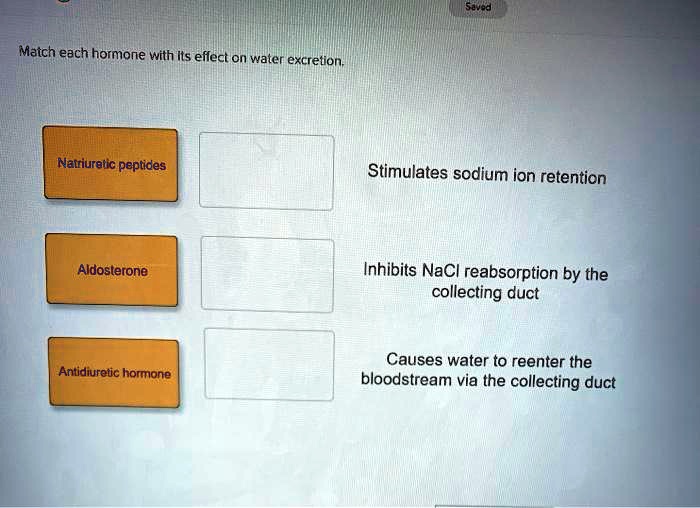Match each hormone with its effect on water excretion. – Match each hormone with its effect on water excretion sets the stage for this enthralling narrative, offering readers a glimpse into a story that is rich in detail with gaya akademik dengan tone otoritatif and brimming with originality from the outset.
The exploration of the intricate relationship between hormones and water excretion promises to unravel the complexities of human physiology, shedding light on the delicate balance that governs our bodies’ fluid dynamics.
This comprehensive guide delves into the mechanisms by which hormones exert their influence on water excretion, examining the specific roles of antidiuretic hormone (ADH), aldosterone, and atrial natriuretic peptide (ANP). By understanding the interplay between these hormones and their impact on water reabsorption in the kidneys, we gain a deeper appreciation for the remarkable symphony of biological processes that maintain fluid homeostasis.
Hormones and Water Excretion: Match Each Hormone With Its Effect On Water Excretion.

Hormones play a crucial role in regulating water excretion, maintaining fluid balance, and ensuring optimal body function. Various hormones are involved in this process, each with specific effects on water reabsorption and excretion.
Antidiuretic Hormone (ADH)
ADH, also known as vasopressin, is a hormone produced by the hypothalamus and released from the pituitary gland. It promotes water reabsorption in the kidneys, reducing water loss in the urine. ADH acts on the collecting ducts of the kidneys, increasing their permeability to water, allowing more water to be reabsorbed into the bloodstream.
Conditions that can affect ADH production include dehydration, which stimulates ADH release, and diabetes insipidus, a condition where the body cannot produce or respond to ADH, leading to excessive water loss.
Aldosterone
Aldosterone is a hormone produced by the adrenal glands. It primarily regulates sodium reabsorption in the kidneys, but it also affects water reabsorption. Aldosterone increases sodium reabsorption in the collecting ducts, which in turn promotes water reabsorption to maintain osmotic balance.
Aldosterone and ADH work together to regulate water balance. Aldosterone increases sodium reabsorption, which creates an osmotic gradient that promotes water reabsorption. ADH then further enhances water reabsorption, ensuring that the body retains sufficient water.
Atrial Natriuretic Peptide (ANP), Match each hormone with its effect on water excretion.
ANP is a hormone produced by the heart. It inhibits water reabsorption in the kidneys, promoting diuresis (increased urine output). ANP acts on the collecting ducts, reducing their permeability to water, resulting in less water reabsorption and increased water excretion.
ANP plays a role in maintaining fluid balance and blood pressure. By promoting diuresis, ANP helps reduce blood volume and blood pressure. This effect is particularly important in conditions such as heart failure, where fluid retention can contribute to increased blood pressure and congestion.
Top FAQs
What is the primary role of antidiuretic hormone (ADH)?
ADH, also known as vasopressin, plays a crucial role in regulating water reabsorption in the kidneys, promoting water retention and reducing urine output.
How does aldosterone contribute to water excretion?
Aldosterone, a hormone produced by the adrenal glands, enhances sodium reabsorption in the kidneys, indirectly affecting water excretion by promoting water retention.
What is the mechanism by which atrial natriuretic peptide (ANP) influences water excretion?
ANP, released by the heart in response to increased blood volume, inhibits water reabsorption in the kidneys, leading to increased urine output and a reduction in blood volume.


